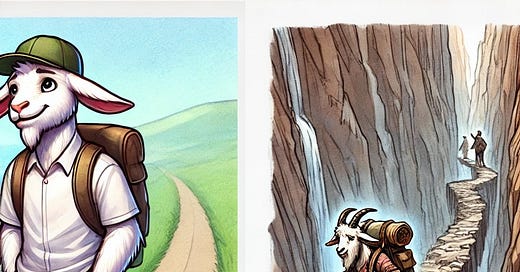Through thick and thin.
There are few phrases in the English language with more alliterative appeal. Imagine saying it out loud, and it seems almost musical, since most of us have had this phrase ingrained in us from a very early age—almost like the phrase itself becomes an individual (new) word.
If it seems like this phrase has been around for a very long time in English, your intuition is spot-on. The first written appearance goes back a few decades before the introduction of the printing press, when manuscripts were laboriously copied (mostly in monasteries).
To give you some idea of how rare and tedious this process was, it might be worth pointing out that there are literally thousands of times more books around than there were before, even though the written word goes back 5000 years or so, and printing only goes back about 600 years.
So, in that short period of time, nearly all of the words we can read today have been written. For every hand-written word that has survived the centuries, there are thousands of printed words—never mind the insane volume of digital text we create every second of every day.
You can imagine how disproportionately important those earlier written words are, then. That may go far to explain how prominent the phrase through thick and thin is. An English writer you may have heard of called Geoffrey Chaucer wrote this down around the year 1386, in a little book he wrote called The Canterbury Tales.
Specifically, the phrase appears in The Reeve's Tale, where Chaucer describes two entrepreneurs chasing after someone who has stolen their corn and run away. They pursue the thief through thikke and thynne, as Chaucer puts it. He means that they literally pursue the man by treading different types of terrain.
Some of the terrain is full of forests and very high vegetation that’s too thick to walk though quickly, while some of the land is more like open grasslands or plains, easy to traverse.
This was quite literal, meaning precisely what it seemed to mean. Over the ensuing centuries, as more and more people came to read the Canterbury Tales (thanks to the printing press), some of the catchy, clever phrases began to take root in common vernacular.
It’s very easy to see how a description of a journey could become a metaphor for life’s ups and downs. This is the idea behind Homer’s The Odyssey, written down thousands of years before Chaucer, and of countless other stories where the hero goes on a perilous trip.
By the 16th century, the phrase was in use more or less as we use it today, with a slightly broader meaning based on relationships. If you’re with someone through thick and thin, you might be describing a marriage, for instance.
One prominent example from my own life: our gyms stayed alive during the pandemic, in spite of the most hostile environment ever for an activity centered around person-to-person contact. You could say that we’ve stuck together through thick and thin, for we’ve also had some very good times together.
Through thick and thin, life has prospered on our planet. There’s abundant life at the very bottom of the ocean, extremophiles like the tardigrade which can theoretically survive in outer space, and a sort of fungus internet that trees and other life forms use to stay alive.
While Chaucer’s phrase eventually came to use the journey as a metaphor for human life, the incredible journey of life on our planet seems like an equally valid place to use this phrase. This fecundity and adaptability blows my mind every day, and I tried to highlight some of that wonder I feel here:
So Many Critters
Suppose you started with one self-replicating life form. It’s a really, really slow moving life form, but it’s capable of reproducing. After literally forty million years, it’s finally able to double, and now there are two critters.
I hope you’ve enjoyed reading this, and I hope most of it was thick with detail, but not thick in the sense of that frustrating vegetation Chaucer had in mind. Through thikke and thynne, we’ve made it to the end of this piece together.






We are in this together. But where does thick as thieves come from?
Love the ending of this piece. I think you could make a whole series on the origin of common phrases.